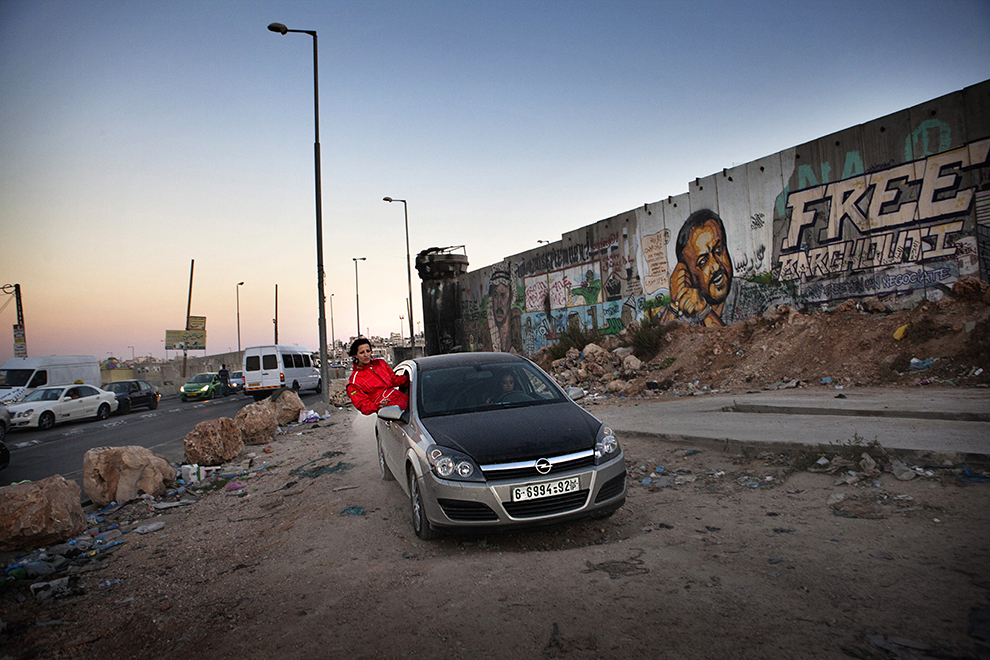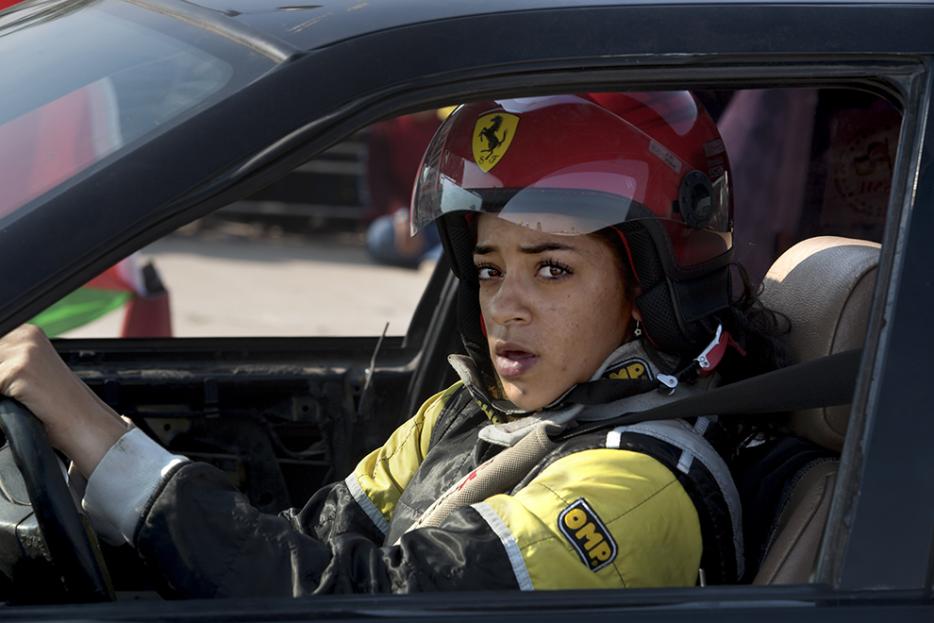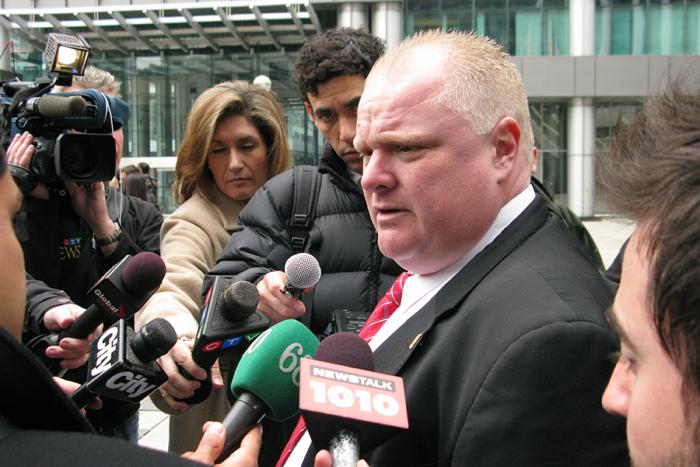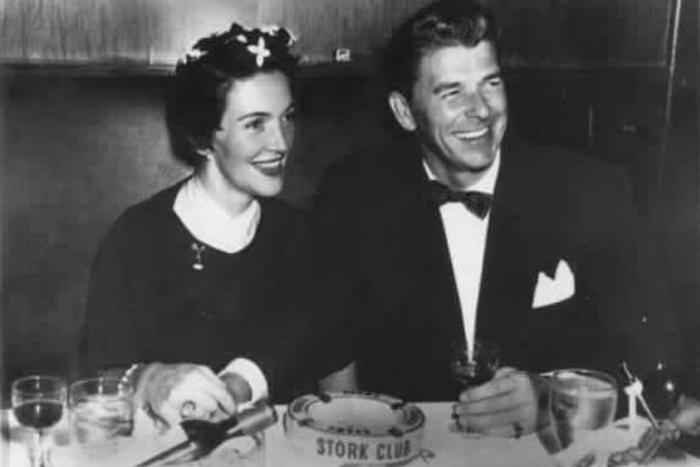In the West Bank, an area slightly smaller than Prince Edward Island, where movement is often obstructed by checkpoints, one may not expect to find a lively car-racing scene. And yet, that's exactly what we're shown in Amber Fares's new documentary, Speed Sisters. The film follows the Middle East's first all-women race car driving team as they compete against their male counterparts and each other. The Speed Sisters are: Maysoon, the team's manager; Mona, who crashes her cars every now and then; Noor, the queen of drifting; Betty, the beautiful champion, and Marah, who's been devoted to racing since she first stole her mom's car when she was 11 years old. Fares has made a fast-paced, thrilling sports film that challenges many well-ingrained stereotypes about the Middle East along the way.
I spoke with Fares by telephone, minutes after she introduced Speed Sisters at the Boston Palestine Film Festival. Actually, her phone rang while she was introducing the film. She (rightly) hung up on me then, but when I got through to her a couple (literally, two) minutes later, she was happy to launch into a discussion about negative portrayals of the Middle East in media, movie villains and women in sport.
Regan Reid: I know you're in the midst of a hectic screening schedule. You just screened in London on Friday.
Amber Fares: Yeah, I was going from London to Toronto and then the Palestine Film Festival in Boston, [which] has been so supportive and amazing, they're doing a special screening at the Museum of Fine Arts. It just happened to be that I could fly from London to Boston and then I'm here for two nights—really just for one night, I got in late last night—and then I fly to Toronto tomorrow.
You're busy.
This is the only time in my life that I'm going to be a rock star [laughs], so I have to milk it for all its worth.
You've been working on this film, in one way or another, since 2010.
Yeah, that's when we first were introduced to the girls.
Can you talk about what brought you to Palestine and how you discovered the Speed Sisters?
For me, it wasn't a direct route to Palestine. I grew up in Northern Alberta. My grandparents came from Lebanon, so we had a very strong Lebanese/Arab influence in our house. But we were also very, very Canadian.
I always say we used to eat a lot of hummus and play a lot of hockey. I never really thought too much about my Lebanese identity or my Arab identity until after 9/11, when there was a lot of push-back toward Muslim and Arab communities. We definitely felt the brunt of that. [I started to] look around at the way that Arabs were being portrayed in the media—not only just in the news media, but also in terms of movies and TV shows. There was such a huge disconnect between the experience that I had growing up in my family and in the Lebanese/Canadian community, and later when I went to Lebanon, there was such a huge disconnect from what I was experiencing to what was being shown. And I think that sort of led me to the Middle East and eventually I ended up in Palestine.
I sat on the board of an organization based in Vancouver that did film camps with Israeli, Palestinian and Canadian youth and that kind of got me over to Palestine as I was doing some work with them in putting together these film camps. I was only going to go for a couple of months and I ended up really liking it. Then I ended up staying and getting into film. Eventually, one day, a friend invited me to go to a race. I was just thinking how strange it was that there would be races in Palestine, given the checkpoints and lack of mobility and not really having access to a lot of space. So we went to Bethlehem and on top of this hill there's this huge tarmac and there are people lining the track and all these cars revving and music playing and it's this amazing festive scene. And in the middle of that, there are these women putting on their helmets to go and race. I was just like What is going on? This is just really unusual. I wasn't expecting that. And that's kind of how it started. [And in] the back of my mind realizing [there was a] need to be telling stories from the Middle East that were more about what life is like, not so much about war and all of these other things that were going on. But people are living there. I think that's a really important thing to remember.
The portrayal of the Middle East in the media hasn't changed much since 9/11.
It hasn't. It hasn't changed.
The increase of Islamophobia is terrifying. I'm in the States right now so perhaps I feel it more than in Canada—I haven't lived in Canada for eight or nine years, so I don't know what's happening as much in Canada as in the States. But it's gotten worse. I think that's why you need movies like Speed Sisters because it personalizes [the Middle East]. It humanizes people.
I saw this interview, I think it was on CNN, it was about Lethbridge [Alberta] and how Lethbridge has incorporated these Syrian refugees into their community, which is just a really beautiful thing. One of the women was saying that she sponsored refugees because it was the right thing to do, but then she got really emotionally involved because she was [like] “They have names and they have birthdays.” They're actual people. She got really connected with the people. It changed everything for her. We've been demonizing the Middle East for so long it feels like it's acceptable. And that's not right.
Your film does a really great job of showing us real people. We see images of women laughing hysterically as they do donuts in a parking lot. And we see men cheering for the Speed Sisters as they compete in their races. This is not what we in North America are accustomed to seeing in media. We are inundated with images of the opposite, of women who we label as oppressed.
There's not one story that defines any one place. There's more nuance to people's lives and to places than what we have access to. I think that's part of it. Not everybody in Palestine is a Speed Sister, but people like the Speed Sisters definitely exist and they exist in other Arab countries as well. I think part of the reason the film plays and has been accepted so well in the Arab world is that they see themselves in the girls. I think for two reasons: one, for Palestinians, really, they are tired of...how they're portrayed in the media. This is so refreshing and they relate to it so much more because it reminds them more of the relationships that they have with each other and with their fathers and with people who are around them. So they like it.
People in the Arab world who live outside of Palestine, they can't access Palestine. In order to get to Palestine they have to go through Israel. It's Israel that controls the borders, so it's very hard for Arabs from other countries to get visas to even travel there. So they don't know what Palestine is like and to see those images of Palestine, that's really strong. I've been told by so many people that they really appreciate being able to see [this]. Because what they also are being exposed to is just what's being shown in the media, which is very much around the conflict and the occupation.
The other thing, too, that is really important...I think I had my own prejudice in terms of what the role of men was in the Middle East. It was surprising for me that, even the head of the [racing] federation, he doesn't come across as the nicest guy, but he is actually the one who created the space for women to race. He's the one who asked Mona to come in, he brought Maysoon in, he had a car there for women to drive, whoever wanted to drive. He's the one who actually created that space.
I've talked to women in the UK and in the States and in other places who race, it's not easy for them to break into racing. It's a very male-dominated sport and I actually think that the people who I came across in that world—in Jordan, in Palestine, in Dubai and all of these places where racing is really popular—they're so supportive and accepting of women. They have to prove themselves that they're not just doing this for fun, that they're really passionate about it. But once they do, they've been really accepted. I think that the film did a lot to break the stereotypes, not only of women, but also of Arab men.
Absolutely. I think that might actually be one of the strongest messages of the film: that these women are supported—celebrated even—by lots of men in their communities. The film also does a good job of showing the reality of daily life in Palestine. The films shows the women crossing Israeli checkpoints; Marah's father discusses growing up as refugee; in one scene, Betty is shot at by Israeli soldiers and hit with a tear gas canister when she's on her way to practice. Even if you didn't intend to, it seems unavoidable to make a documentary in Palestine that is not political.
You can't talk about Palestine and the life of Palestinians without it being political. Their lives are political. But we made a creative decision and a value-based decision very, very early on in our editing that we were only going to show the occupation as it applied to them directly, as it affects their lives. Sort of like show not tell. So [we] very purposely did not have an explanation of the occupation, did not have any definition of any of the history or the politics that were going on, but allowed the politics to come through as they affected the lives of the women. That's how we dealt with the politics.
It's powerful to see. Especially the scene when Marah, who was in her early 20s, crosses into Israel for the first time in her life and finally gets to swim in the sea.
Exactly.

Nemesis, thank you. It was interesting to me that I immediately saw her as that. Because she's also a serious, fierce competitor who is out to beat not just her teammates, but the male competitors as well. This is her job, to compete. I found myself having to confront internal biases that I was shocked to learn I had within me.
Definitely, because then you start to question...I don't know, did you see Senna [the 2010 documentary about Formula One race car driver Ayrton Senna]?
Yes.
Did you have the same sort of feeling when the French guy [Alain Prost, Senna's “nemesis” and one-time teammate] was on screen?
I wasn't affronted by him in the ways that I was with Betty.
It's an interesting thing in that we expect men to be competitors in that way. They can separate the competition from friendship and the personal and their competitive nature. I think with women we have different biases when it comes to that. They always get asked, are they friends off the track?, and what their relationship is like. The thing is, competition on teams exists. I used to play volleyball, you would compete for the position that you wanted to start in.
Whether you're competing against [another team] or you're on the same team, there's a level of competition. That's inherent to sport. But we take it so much more personally when it's women. For a lot of women too, Betty's personality is—we all know that woman and a lot of us don't like her. That's part of it too. But she has a very particular aesthetic and a healthy sense of confidence. Also how we treat other women who are like that too. It's a very interesting conversation to have in the midst of a US campaign right now where you have Hilary Clinton and [see] what's being thrown at her because of her agenda. [How] we allow for men to behave, versus how we allow women to behave in public spaces, what we expect of women.
And how we want them to be seen.
Yeah. It is interesting.
Obviously the way the film is constructed, you're going to cheer for Marah. She's the girl next door. It's a pretty classic film structure. It's kind of built that way. But the amount that Betty sort of affronts some people, it's really interesting to see.
You worked with an all-female crew. Do you think that benefited you on the film?
It did. We were doing a film about women and we really wanted to create a space where they felt safe and secure.
It was almost like we had a girl gang. We would hang out with them and it gave them a lot of confidence. I've had this argument with male cinematographers, a man doesn't know the effect that they have when [they're] working with all women.
They think, If you're a good cinematographer, it doesn't matter. [But] it does matter. It does matter. Having all women and having just one guy, especially the guy behind the camera, it affects the way that they interact. Whereas we created a space where we were all friends and confidants and it gave [the Speed Sisters] a really safe space in which they felt that they could express themselves. And I think you see that on camera. That translates to the intimacy and the humour and all of that. They felt safe to be able to say whatever came to their minds. And then also, in terms of access in general, it's very disarming to have three women rolling around when we were filming. With the federation, at the races, those type of things, I felt like it actually helped us in terms of access. And I would work with an all-female crew again. I like the camaraderie and the relationships that are built.
Regardless of the subject matter or who your characters are?
Yeah. I mean I would always try to promote women, especially in film when there are so many opportunities, there are so many male cinematographers and directors. I wouldn't just pick somebody because they are female, but at the same time I would like to be able to provide opportunities for [women] to be able to get really great projects like that. Even our editor was female and Palestinian...As a Palestinian editor, films like that just don't drop on your lap.
The film was better for it, I think.
I think so too. The sensitivities and the nuances, not only being Palestinian, but also being a woman and understanding and feeling the girls. For us, it was really the right choice to create a whole female perspective on the film.






